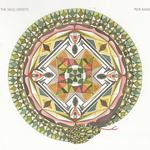
The Skull Defekts Peer Amid
(Thrill Jockey)
Around four minutes into first and title track of Peer Amid, I began to wonder why it hadn’t finished yet. The song is bread-and-butter garage rock, with a one-note bass riff and a simple 4/4 beat - not bad foundations for a three-minute blast, perhaps. To my surprise, there were still five minutes left: surely some kind of epic twist is coming, I thought. I was wrong - five more minutes of paint-by-numbers rock ensued.
The next track, No More Always, is remarkably similar. The melody is slightly more varied, but the overall sound is just the same, sitting somewhere between The Hives and Black Rebel Motorcycle Club. The song almost entirely revolves around a nonsensical vocal hook: “Nobody nothing nowhere no more / Nobody nothing no more”. It’s sheer style over substance, the kind that’s rife in indie rock’s lower echelons, and it’s nothing short of grating.
This is more or less the pattern for the rest of the album. You can see what they’re aiming at: the slow pace and gradual buildup of noise in each track suggests grandiose ambitions, but the band lacks the musical intelligence to pull it off. New lead singer Daniel Higgs (of Lungfish fame) does not help matters with his pretentious, haunted house vocals.
What The Skull Defekts fail to understand is that this kind of repetition only works in the right context. For artists who do repetition well, it’s either accompanied by subtle shifts in the music that prevent it from becoming stagnant, or it’s used as a bridge between different stages of an album. But Peer Amid’s reliance on a clichéd, derivative garage rock sound simply doesn’t allow for the kind of variation necessary to make it interesting. The result is a record that is tedious and self-indulgent.
The Skull Defekts are not naive: in interviews, they’ve said that repetition is what they do. By their own admission, their music is “dumb”. But that doesn’t make it a good thing. Their live performances are largely improvised around one riff per song, which could make for an interesting show - but on this record, it gets old fast.
18 February, 2011 - 15:39 — Joel Stanier